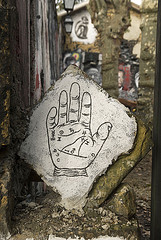Jun 20, 2011
On Message
 In my post about Odd Future, I said that music today—”mainstream” music, pop, country, “urban,” etc.—was devoid of message; it goes without saying that I was referring to a “political” message.
In my post about Odd Future, I said that music today—”mainstream” music, pop, country, “urban,” etc.—was devoid of message; it goes without saying that I was referring to a “political” message.
The messages of today’s music, on the contrary, from Rihanna and Katy Perry to the Kings of Leon, Coldplay and the Arctic Monkeys, are entirely “personal” (in the impersonal sense of anything produced for mass consumption, not “personal”in the sense of “uniquely idiosyncratic” or “obscurely private” — and especially not “personal” in the political sense).
This was not always so. Indeed, there was a time when the mainstream had its “political” hits: “99 Luftballons,” “London Calling,” and the incredibly incomparable, “We Are the World,” to name but a few. (If you haven’t seen the video for the latter song in a while, I urge you to check it out again. It has withstood the test of time and emerged, if possible, stranger. It’s particularly striking how the humanistic idealism of the song is drastically relativized by the fact that many of the people singing it are (or have become) millionaires, some in the “multi”-range. This fact makes the line, “We’re saving our own lives,” coming from certain lips, especially incongruous and even a little jarring.)
This complaint about popular music, however, does not mean that you can’t find tendentious and engaged music out there. It just means that, if you want music with a message, contemporary or vintage, you just have to look for it.
To take one example (albeit from 2001!), consider, “The Sickness,” recorded by the RZA (as “Bobby Digital”), with its impassioned (Nation of Gods and Earths) fundamentalist ethos (“Bless the seeds who praise the Most High without asking why”) and archaically militant refrain: “So praise the Lord/ and raise your sword/ against this wicked society/Society.”
The “message” I hear in “The Sickness” is not ideologically pure or even entirely coherent. Indeed, this haunting song shows how true messages, messages that might actually change the way things are and bring about that which could be (a better, higher humanity/a rejuvenated Earth) are often (best?) spoken in the allegorical voice of prophecy. For example, in the final stanza, one of the greatest stanzas of rap ever enunciated, the RZA lays out a rich vision of a utopian tribe (“group of people”), a mythical past, and an apocalyptic future:
There was a legend of a +Liquid Sword+
That was +Only Built 4+ niggas with +Cuban Linx+
Who +Entered the 36th Chamber+
and keep the true links, inherit +The W+ emblem
Movin’ the muscle changin’ and bone tendon bendin’
Science of 25 thousand year millennium
The sinners from the men who exiled the Indians from India
Who’s times can’t be measured linear
In all tribes on Earth who can’t find a friendlier group of people
who shunt all evil, treat all men equal
Even though we see through your wicked intentions
We gave you land to experiment with your inventions
But you strive for global lynchin’, extension
But it’s yourself that will become extinct
You inherit this power to think and build things
The free wills of love, not hate or kill things
And when you went astray, we sent prophets to reveal things
And left scriptures behind to fulfill things
But you still wanna kill things, rob and steal things
So don’t blame us when it’s time to fulfill things and kill Kings
As mentioned, I can’t say precisely what the message of this song is, but I’m certain it has a message, and ultimately, a quasi-messianic warning: Those that make your world possible are returning (or rising) to claim it.
Is this a religio-fascist message? Is this a utopian communist message? Is this a racial message? All of these seem possible, though the ambiguity of the speaker’s identity—thanks to the double persona of RZA and Bobby—along with the inscrutable location in time and space of the race described (an oracular opacity that lends the whole thing an air of arcane fantasy), bars a definitive response.
The question remains: Why does this message, steeped as it is in an outright mystical violence, resonate with me?
Is it because I believe the world to be doomed, due in no small part to the thuggish brutality, insatiable greed, and short-sighted stupidity of men?
Is it because I believe there is evil in the world, but that this evil can be vanquished by the resolve of the righteous?
Is it because I believe that armed revolt is the right of the oppressed? Or that the equilibrium of society is really just the slow motion struggle of various human collectives competing for resources and control of the environment and that revolutions are the acceleration of these conflicts, often resulting in new collective formations and slow-motion struggle by other means?
It has been said that the status quo is maintained by the exercise of violence, and that the state has a monopoly over the exercise of violence. Of course, this means that the status quo can be changed by the exercise of violence (or acts of resistance). Does this song resonate with me because I believe that sometimes this should occur [insert Jefferson’s—”The tree of liberty must be refreshed from time to time with the blood of patriots & tyrants”—quote here]?
I don’t know. Why does the song end with the words, “The sickness. That’s what I want”?
[Note added 3/28/2013 – Technically, the song ends with the exchange, “What are you looking for?””A man with no mother.” Which actually fits with the mytho-poetic aspect of the whole thing. – Matt]
Image Source: Abode of Chaos.
Recent Comments